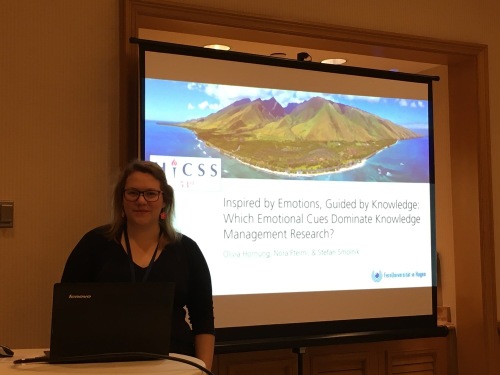Aktuelles
Professor Stefan Smolnik und Olivia Hornung auf der HICSS-53 aktiv
[11.01.2020]53rd Hawaii International Conference on System Sciences, January 7-10, 2020, Maui, Hawaii, US
Die Artikel "Inspired by Emotions, Guided by Knowledge: Which Emotional Cues Dominate Knowledge Management Research?" von Olivia Hornung, Dr. Nora Fteimi und Professor Stefan Smolnik sowie "Knowledge Unchained or Strategically Overseen? Knowledge Management in Open Source Software Projects" von Stefan Riembauer, Olivia Hornung und Professor Stefan Smolnik wurden zur Präsentation und Veröffentlichung auf der 53. Hawaii International Conference on System Sciences (HICSS-53) angenommen. Die HICSS-53 findet vom 07.01.2020 bis zum 10.01.2020 im Grand Wailea auf Maui, Hawaii, USA, statt. Olivia Hornung präsentiert beide Artikel im Rahmen der HICSS-53.
Darüber hinaus ist Professor Stefan Smolnik Mitausrichter von zwei Minitracks auf der HICSS-53. Den Minitrack "Value, Success and Performance Measurements of Knowledge, Innovation and Entrepreneurial Systems" richtet er zusammen mit den Professoren Murray E. Jennex (San Diego State University) und David T. Croasdell (University of Nevada in Reno) aus; den Minitrack "Design and Appropriation of Knowledge and AI Systems" zusammen mit den Professoren Pierre Hadaya und David Holford (beide Université du Québec à Montréal, Canada).
Olivia Hornung, Nora Fteimi, Stefan Smolnik: Inspired by Emotions, Guided by Knowledge: Which Emotional Cues Dominate Knowledge Management Research?
Zusammenfassung: Knowledge, being context-specific and bound to individuals, is strongly related to human emotions such as joy or fear. Although emotions play an important role to articulate knowledge in text, KM research only offers insight on emotions from specific angles, neglecting a holistic view. Applying a sentiment analysis, this study closes the aforementioned gap by investigating the occurrence of emotions in KM publications. Based on general sentiment dictionaries, we (1) develop a dictionary aligned with KM, and (2) apply it to KM publications to determine the presence of positive and negative emotions and categorize them according to an emotion scale. Our results reveal that a variety of emotions is expressed in KM studies, both positive and negative, proving its relevance for this domain. We find that there is high term diversity, but also the need for consolidation of terms as well as emotion categories in KM.
Stefan Riembauer, Olivia Hornung, Stefan Smolnik: Knowledge Unchained or Strategically Overseen? Knowledge Management in Open Source Software Projects
Zusammenfassung: The term “open source software” was formally introduced in the early 2000s to describe source code which are available to the public to be used and modified by anyone. Like any innovative idea attaining a certain maturity level, open source communities have reached a degree of formalization in their structures and practices. This also holds for knowledge management and its related measures in open source communities. Therefore, we investigate the patterns and structures in communication and collaboration of the currently most successful open source software projects through a case study approach. Herewith, we reveal how the different knowledge management aspects are practiced in these internet communities. Due to the projects’ success, we identify similarities as good practices and derive practical recommendations for action for other open source communities as well as research opportunities regarding knowledge management in open source software projects.
 Foto: BAS-Lehrstuhl
Foto: BAS-Lehrstuhl


